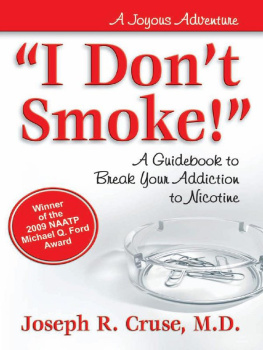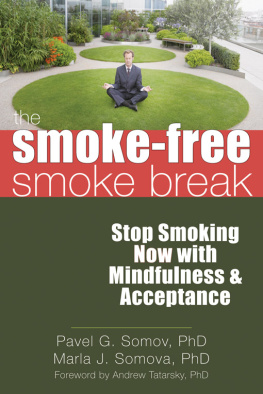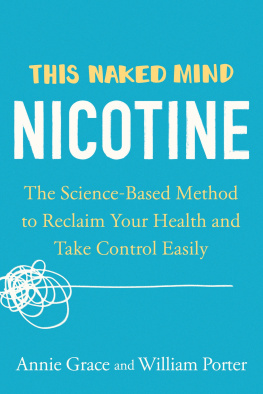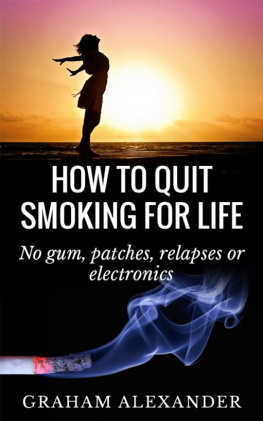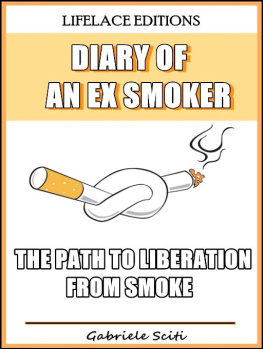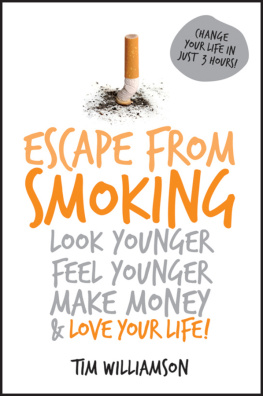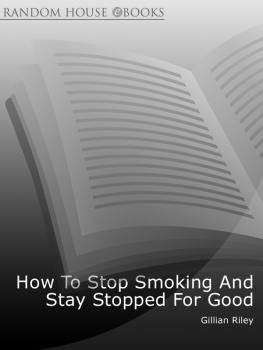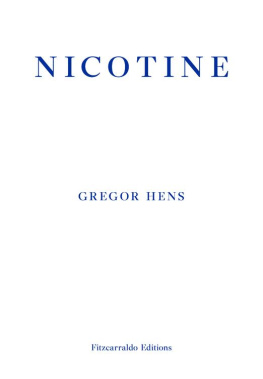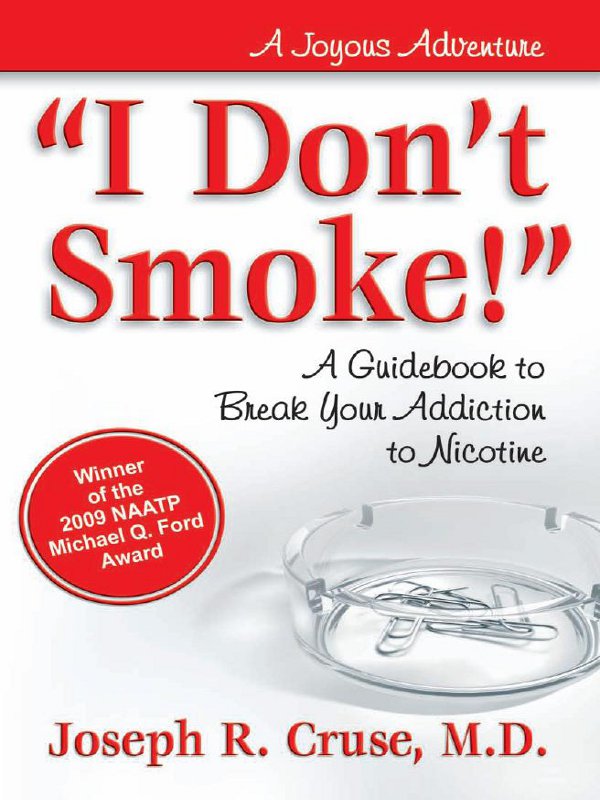
My Cheering Squad
Names and Phone Numbers of My Support System
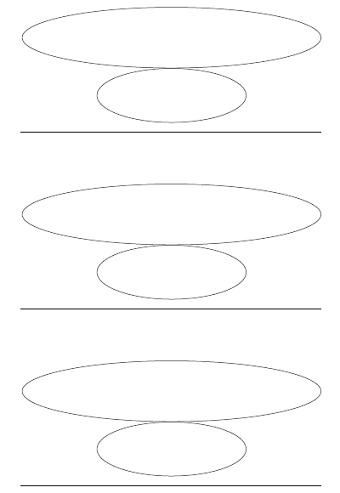
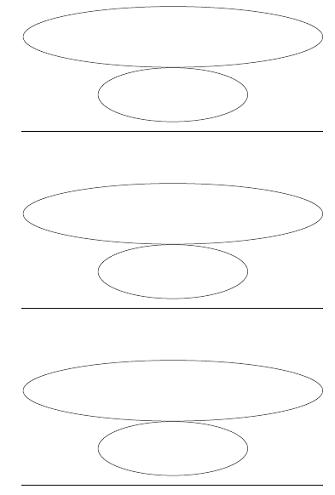
A Joyous Adventure
I Don't
Smoke!
A Guidebook to
Break Your Addition
to Nicotine
Joseph R. Cruse, M.D.

www.hcibooks.com
The information contained herein is provided for your general information only. This book does not give medical advice or engage in the practice of medicine. Under no circumstances do we recommend a particular treatment for specific individuals. In all cases we recommend that you consult your physician or local treatment center before pursuing any course of drug therapy for nicotine cessation, for example, nicotine replacement therapy.
Library of Congress Cataloging-in-Publication Data
Cruse, Joseph R., 1930
I dont smoke! : a guidebook to break your addiction to nicotine / Joseph R. Cruse.
p. cm.
eISBN-13: 978-0-7573-9582-6 eISBN-10: 0-7573-9582-1
1. Smoking cessation. 2. Nicotine addiction. I. Title.
HV5740.C78 2009
616.86'506dc22
2009025621
2008, 2009 Joseph R. Cruse, M.D.
All rights reserved. Printed in the United States of America. No part of this publication may be reproduced, stored in a retrieval system, or transmitted in any form or by any means, electronic, mechanical, photocopying, recording, or otherwise, without the written permission of the publisher.
HCI, its logos, and marks are trademarks of Health Communications, Inc.
Publisher: Health Communications, Inc.
3201 S.W. 15th Street
Deerfield Beach, FL 334428190
Cover design by Larissa Hise Henoch
Interior design and formatting by Dawn Von Strolley Grove
To Sharon
The lady who saved my lungs, and more especially, my heart,
for us to enjoy during the third third of my life.
To Peggy
Special thanks to artist Peggy Musegades
for the fun we had doing the illustrations.
I DONT SMOKE!
Most adult cigarette smokers wish they could say that...
Eighty percent of adult smokers want to quit completely,
according to a survey by Gallup and the National Centers
for Disease Control and Prevention.
But the nicotine in cigarettes is an addictive drug
that makes quitting difficult... but not impossible.
Contents
Hoping is active and wishing is passive.
Hoping means seeing that the outcome you
want is possible and then working for it.
Wishing means just sitting, waiting for a
miracle to happen out of the blue.
BERNIE SEIGEL, M.D.
What This Book Is Not About
This book is not full of depressing statistics on smoking, although some are mentioned. It is not about scaring you with diseases you can get from smoking, although some of those are mentioned. And its not about shocking you with graphic images of a jarful of tobacco tar or a cancerous lung. Instead, there are some fun drawings.
What This Book Is About
This book is about a very different approach to smoking cessation. Its an approach that focuses on younot the nicotine. Its an approach that looks at quitting as a joyous adventure. After all, youre going to be free of a serious addictionlike overthrowing a dictator. Its an approach that will make you laugh and feel good while you are freeing yourself from your addiction. Most important, its an approach that works. People who have used this program had a high success rate at the end of one year. And they had a good time doing it. They can still say, I Dont Smoke! So can you.
Where This Approach Originated
The approach behind I Dont Smoke! began in 1984 at Onsite Training and Counsulting Counseling, now Onsite Workshops. That year, the companys CEO notified the sixty-five full-time and part-time employees that Onsite staff who used nicotine in any form would be expected to be comfortably nicotine free by November 1985. This would include administrative and clinical staff. Smoking clients were also told that the program and facilities had become smoke free and that an ancillary support program and professional help for nicotine addiction were available to them.
At that time Onsite and many other treatment programs had not seriously addressed the problem of nicotine addiction directly. Other drug problems, including alcoholism, eating disorders, and other mental health problems were more important and seemed to take precedence. Both the public and professional thinking was that the problem was just smoking, not addiction.
Staff and clients largely accepted the announcement with little disagreement. They knew it was a logical policy, but the smokers were hesitant. They were not happy being caught in the change; the need to stop smoking is scary. But when they took a good look at nicotine dependence as a widespread and powerful addiction with many negative consequences in their lives, their resistance faded.
I Dont Smoke! is based on the techniques, theories, practices, and procedures that evolved out of that program change and its philosophy. The results were quite encouraging. In addition to everyone pulling together for the new nonsmoker, the emotional relief and the sharing between smokers and nonsmokers added new dimensions to the program.
Therapists were startled to find that those in nicotine withdrawal were more receptive to therapy than when they were medicated with nicotine. The intensity of the work over eight days and the rapid detox with short-term or no nicotine replacement therapy (NRT) allowed most of the participants to return home comfortably free of nicotine. Initial follow-up revealed a 72 percent abstinence rate at the end of one year.
This model for recovery from nicotine addiction is based on increasing self-worth, retraining the addicted brain, use of emotions by receiving help from others, and then helping others. Like any adventure, this model requires action.
HERE IS THE ACTION LIST:
BELIEVE YOU ARE WORTH IT.
CLEAN HOUSE.
TRAIN YOUR BRAIN.
FEEL LOVED BY ACCEPTING HELP FROM OTHERS.
FEEL LOVE BY GIVING HELP TO OTHERS.
The adventure starts here...
Dont try to jump over seven-foot bars.
I look for one-foot bars I can step over.
Warren Buffet
This book guides you on an adventurea true adventure that will change your life...
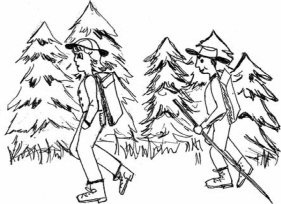
Many times when an event changes our lives, unless it is a catastrophe, we are not aware it has changed our lives until later. We may not be mindful of it at the time. We look back and say, Oh yeah, thats when it started to be different... perhaps it was an initial meeting and becoming acquainted with a coworker. Later the two of you become important team workers.
This is one of those adventures that you will know about at the time it is occurring, and it wont be based on a catastrophe. It will be based on a cause for daily celebrating... starting on day one!
Next page
